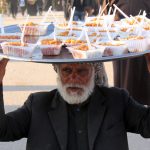The generous hospitality of Iraqi people during the Arbaeen pilgrimage has been added to UNESCO’s prestigious heritage list.
“Provision of services and hospitality during the Arba’in (Arbaeen) visitation” has won world heritage status, joining UNESCO’s culture list as one of the most prominent social and cultural characteristics of the Arab nation to cherish the religious event, YJC reported on Saturday.
UNESCO accepted the traditional hospitality on the world body’s list of the Intangible Cultural Heritage of Humanity during the annual meeting of the Intergovernmental Committee for the Safeguarding the Intangible Cultural Heritage, which was held in the Colombian capital of Bogota, sources reported.
Arbaeen pilgrimage, aka Arbaeen trek, is a characteristic spiritual exercise in which hundreds of thousands of Shia and Sunni Muslims, even Christians and Zoroastrians, etc. from various nationalities participate.
The long trek is destined to Karbala, where Imam Hussein (AS), the grandson of Prophet Muhammad (PBUH), is laid to rest. The event marks an end to the 40-day mourning period following martyrdom of the Imam and his loyal companions at the Battle of Karbala on Muharram 10 in the year 61 AH (680 CE).
According to the UN cultural body, the trend is a social practice performed across the central and southern regions of Iraq, from where processions of visitors and pilgrims converge towards the holy city of Karbala.
The tradition – a social practice with deep roots in the Iraqi and Arab tradition of hospitality – is an immense display of charity through volunteering and social mobilization and considered to be a defining element of Iraq’s cultural identity.
Every year, around the 20th of the Islamic month of Safar, the Iraqi province of Karbala receives millions of visitors in one of the world’s most populous religious pilgrimages.
Hailing from different regions in Iraq and abroad, visitors walk to the holy shrine of Imam Hussein (AS). A vast number of people contribute their time and resources to providing the pilgrims with free services along the route. Starting at least two weeks before the date of Arbaeen, associations set up temporary facilities or reopen more permanent ones along the pilgrimage routes, including prayer halls, guest houses and stands offering various services.
Many people also open their houses for free overnight accommodation. Bearers and practitioners include cooks, families offering hospitality, the administration of the two holy shrines in Karbala, volunteer guides, volunteer medical teams, and benefactors contributing generous donations.
source:tehrantimes
 Ijtihad Network Being Wise and Faithful Muslim in the Contemporary World
Ijtihad Network Being Wise and Faithful Muslim in the Contemporary World





